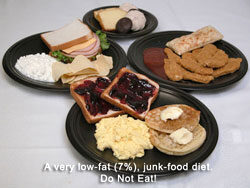Women’s Health Initiative Report
“Low-fat diet may not cut some disease risks; little change seen in cancer, heart problems”
A Clear Case Against Moderation
 In the early 1990s, the founders of the Women’s Health Initiative (WHI) study were guests on my syndicated radio show. During these interviews, and on many other occasions, I challenged Ernst Wynder, MD (now deceased) and Rowan Chlebowski, MD to teach the women in their study a meaningful diet — specifically, a very low-fat, plant-food-based, McDougall-type diet — so that when the day comes that the results are published the real benefits of healthy eating will be shown. Both insisted that the “moderate diet” they were using would be adequate. Twelve years and $415 million later, on Wednesday, February 8, 2006, news headlines about their research findings showed them wrong. Please understand that I take no joy in being right; rather I am saddened because now we all must live with the incorrect conclusions that diet cannot prevent cancer or heart disease.
In the early 1990s, the founders of the Women’s Health Initiative (WHI) study were guests on my syndicated radio show. During these interviews, and on many other occasions, I challenged Ernst Wynder, MD (now deceased) and Rowan Chlebowski, MD to teach the women in their study a meaningful diet — specifically, a very low-fat, plant-food-based, McDougall-type diet — so that when the day comes that the results are published the real benefits of healthy eating will be shown. Both insisted that the “moderate diet” they were using would be adequate. Twelve years and $415 million later, on Wednesday, February 8, 2006, news headlines about their research findings showed them wrong. Please understand that I take no joy in being right; rather I am saddened because now we all must live with the incorrect conclusions that diet cannot prevent cancer or heart disease.
The truth is, this study of nearly 50,000 older women, ages 50 to 79 years, has only reinforced the well-known fact that “skinning your chicken” and “drinking low-fat milk” is inconsequential. The Women’s Health Initiative was not the first, nor is it likely to be the last, study to prove that what most people consider to be a “reasonable, moderate or prudent diet” is at best a trivial improvement over the disease-causing, standard American diet.
Proof that the low-fat diet intervention used in this study was ineffective is the report of an average of one pound (0.4 Kg) of weight loss after 8 years of dieting (compared to those not dieting). Furthermore, the women’s blood levels of cholesterol and triglycerides, and blood pressures hardly changed after all that effort. Their dietary histories revealed that even though the low-fat diet group received “an intensive behavior modification program that consisted of 18 group sessions in the first year and quarterly maintenance sessions thereafter,” they continued to eat nearly the same amount of fiber, protein, red meat, chicken, fish, and grains. The addition of one more serving of fruits and vegetables daily may have accounted for the 9% reduction in breast cancer observed for the low-fat group.
People worldwide have been, and are still being, betrayed by investigators who spend taxpayer’s dollars on useless dietary research — and they should not be forgiven because they have always known better. Since the 1950s studies have shown that the more plant-foods, and less processed and animal foods, populations consume, the less breast and colon cancer and heart disease they will develop. Furthermore, there is no “safe threshold” — in other words, the lower the fat intake, the less the cancer and heart disease. In fact, long before the Women’s Health Initiative study was conceived, Dr. Ernst Wynder had published extensively on the benefits of the very-low fat (10%), almost vegetarian, Japanese diet for prevention and treatment of breast cancer. So why was a “moderate” diet, instead of the best one, tested?
My nearly 40 years of experience, working with hundreds of influential doctors and scientists, leads me to believe they have a very low opinion of patients and the public in general. They believe we are too stupid and too uninterested in our own welfare to make meaningful changes in our diet — specifically, to follow a plant-food based diet. When I suggest such powerful dietary changes, they respond with, “That’s unreasonable; no one will follow a vegetarian diet.” Even if they were correct, you and I still deserve to know the truth, so that this option for preventing illnesses and premature death is available to us.
The Women’s Heath Initiative should be remembered as the study that inspired honesty in the scientific community and put an end to ineffective research using a “sensible diet.” No longer should the excuse that people won’t follow a truly healthy diet be accepted — we who do so know better. My sentiments about the “the failure of the low-fat diet” are succinctly summed up by this recent e-mail to me: “Please come out against this foolish study. I have become a low-fat vegan, and I have lost 30 lb. or so.”
John McDougall, MD
Recommended Articles

Alzheimer's Disease is Caused by Chronic Aluminum Poisoning

Holiday Meal Planning & Recipes
![Who Needs to Take Statins? [What You Need to Know]](https://www.drmcdougall.com/wp-content/uploads/2023/02/Statins-500x333.jpeg)






